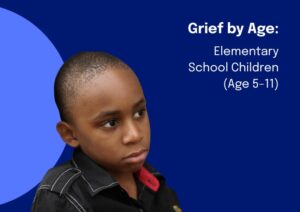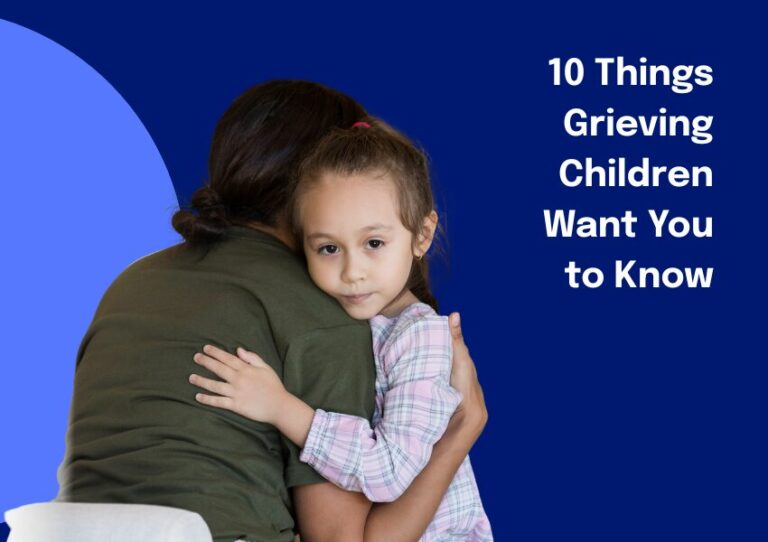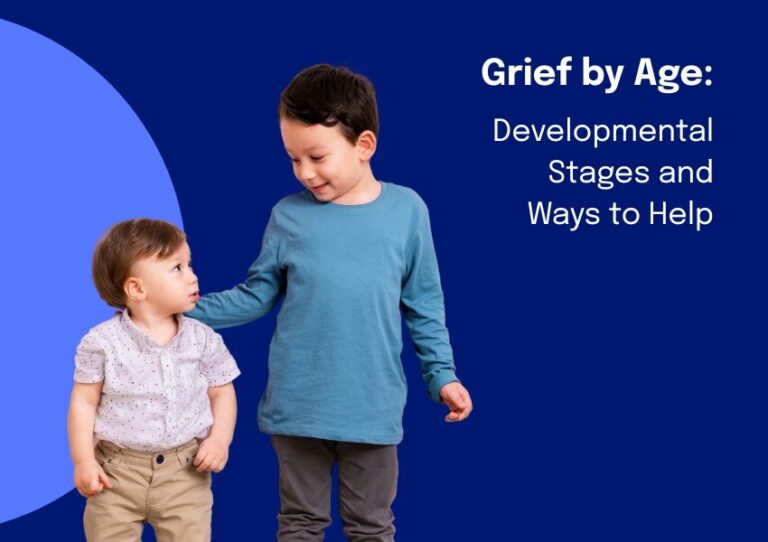Grief by Age: Elementary School Children (Age 5-11)

Developmental Stage: During the elementary school age range, children are developing cognitive, social, emotional, and moral reasoning. Children will begin to socialize and identify friend groups. Competition, eagerness, fairness, and rule-following are common traits of this age group. Anxiety and phobias may also form during this stage (scared of spiders, monsters under the bed, etc.)
Concept of Life & Death: Children will gradually start to understand that death is permanent, and the person will not return. Children may believe that death has scary and mysterious powers. Around age 9, children start to understand that death is both personal (that they will eventually die) and universal (that all living things will die).
Symptoms of Grief: All children, regardless of their experience with grief, may exhibit the following traits at various ages and stages of their life. However, research has found that after the death of loved one, children may have prolonged or more extreme experiences with one or more of the following symptoms:
- Behavioral:
- irritability
- tantrums
- aggressive outbursts
- argumentative
- impulsive
- hyperactive
- difficulty with change
- social challenges or isolation
- fills emptiness with screentime or eating
- Emotional:
- scared about the safety of others
- fear of disapproval
- feeling helpless or hopeless
- Physical:
- frequent stomachaches, headaches, colds
- difficulty sleeping (nightmares)
- loss of appetite or overeating
- hair may start falling out
- Cognitive:
- trouble in school and paying attention
- identifies with deceased
- obsessed about details around death and dying
How to Help – the 6 Rs:
Reassure:
- Stay present and focused on building your relationship with the child.
- Reassure them with messages of safety and belonging for the child.
- Identify special ways that the deceased person would soothe the child and incorporate these into daily routines (cooking a favorite dinner/dessert on the weekend, playing a favorite type of music on the way home from school, comforting child with a special item of choice like a sweater of the person who died).
- Be available for emotional needs and acknowledge feelings.
- Model appropriate ways to express grief and fill feelings of emptiness (drawing a body map or tossing a ball together when feeling sad).
- Provide choices whenever possible.
- Set limits for unsafe or unhealthy aggression.
Routine:
- Stick to a sleep, eating, and an after-school routine if possible.
- Increase predictability in their environment (set family dinner time, etc.)
Release:
- Provide time for creative outlets through play, art, dancing, and music.
- Check out age-appropriate books about grief to read together.
- Plan regular physical activities (sports, exercise, yoga, dance).
Remember:
- Allow child to keep mementos of deceased loved one.
- Include child in memorializing/funeral activities.
- Create a legacy book or box to store mementos and special items.
Reflect & Connect:
- Answer all questions about the death of their significant person. Respond to questions with concise and concrete answers. Avoid giving advice unless requested. Ask about excessive daydreaming.
- Prepare by reading 10 Things Grieving Children Want You To Know or Seven Suggestions for Explaining Death to Children.
- When explaining the death, using simple and short sentences. Use the words dead and died. Avoid euphemisms such as “gone”, “passed on”, “lost”. Here are some sample scripts to consider:
“Daddy’s heart stopped working.”
“Your mom had an accident and died from her injuries.”
“Grandma died today, and we will not be seeing her again.”
“Grandpa died today and won’t be coming back home from the hospital.”
- Help children find a support network of trusted peers and adults.
- For toxic shame or survivor guilt allow child to spend time with a person who had a similar experience.
Reach out:
- Visit the National Program Guide (NPG) to find counseling and support groups in your area.
- Proactively intervene and respond promptly to signs of depression or abnormal behaviors: National Suicide Prevention Lifeline or 988.
- For additional resources, visit our Resource Library or contact us directly for personalized support specific to your area and needs.


